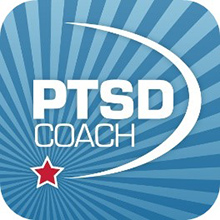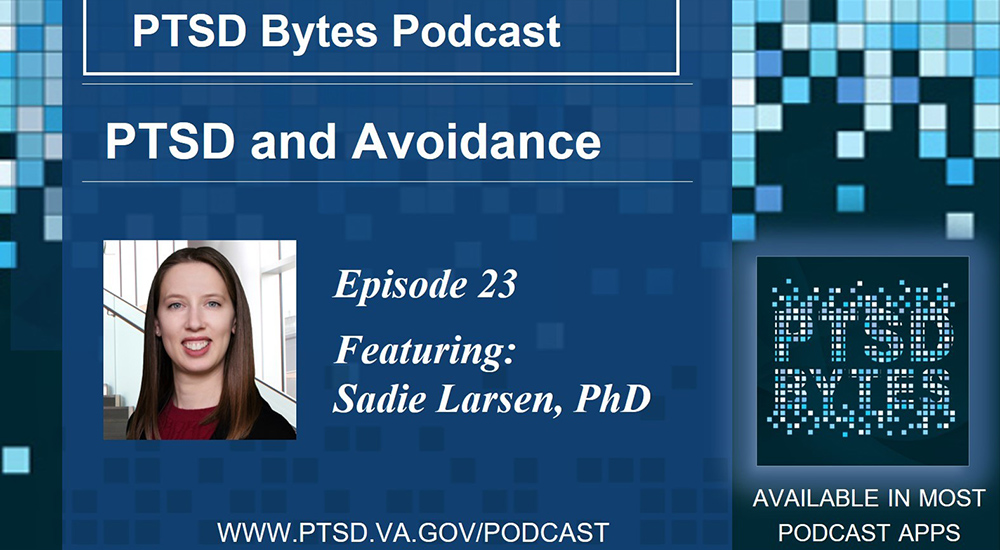In this episode of the PTSD Bytes podcast, new host Dr. Colleen Becket-Davenport discusses PTSD and avoidance. Dr. Sadie Larsen, clinical psychologist at the National Center for PTSD, describes what avoidance looks like, why we do it, and how it can interfere with recovery from PTSD.
Listen here: www.spreaker.com/user/11014928/forreview-ncptsd-larsen-010923-v3.
What is PTSD-related avoidance?

And there are many different ways you can try to avoid. For example, you might distract yourself with work so you don’t think about the trauma. Or you might drink alcohol to numb any negative feelings about the trauma.
PTSD-related avoidance may be hard to recognize. Maybe you stay home at night because it seems a sensible way to stay safe. However, if you used to easily go out at night before the trauma or if other people in your neighborhood are not concerned about safety at night, these are signs that staying home could be PTSD-related avoidance.
Veteran Jeff Goodrich describes how “avoidance was his life”:
How can PTSD-related avoidance be a problem?
While avoidance is an understandable response, PTSD-related avoidance can become a problem. First, you may start by avoiding a specific thing but that avoidance gets larger or generalizes over time. Perhaps you start by avoiding people who remind you of your trauma, and that slowly grows until you’re avoiding everybody and end up socially isolated.
Second, by avoiding a painful thing, you never get the chance to learn that you can handle it or that you’re stronger than you realize. In other words, avoidance can start to take over your life by interfering with things that are important to you and by keeping you stuck.
What can you do about PTSD-related avoidance?
It can be challenging to face things that you’re afraid of or uncomfortable with. However, you can break down what you’re avoiding into smaller, easier steps to teach your brain that you are safe. Then you can slowly build up to face more challenging tasks. Over time, you should notice that your anxiety goes down and so will your need to avoid.
Professional help
If you’re struggling with PTSD and avoidance, there are effective therapies you can try. Cognitive Behavioral Therapy and trauma-focused therapies like Prolonged Exposure, Cognitive Processing Therapy, and EMDR are designed to help you face things that are hard to face.
Digital tools
The PTSD Coach mobile app can help with avoidance. The RID (Relax, Identify, Decide) tool can help you cope if you’re triggered by a trauma reminder. It walks you through a relaxation exercise and helps you identify what triggered you. It also helps you recognize that even though you were reminded of the trauma, you are safe right now.
The RID tool then guides you in deciding what to do to manage your anxiety in the moment. You can also learn more about avoidance in the “Learn” section of the app, which covers topics such as social isolation. The National Center for PTSD website also has information about PTSD and avoidance.
If PTSD-related avoidance is interfering with the life you want to live, know that you’re not alone and that there are many resources available to help you on the path to recovery.
Additional links
- Online PTSD Treatment Decision Aid
- More information about PTSD and its treatments on the National Center for PTSD website
- More PTSD Bytes episodes
If you are a Veteran who is experiencing a crisis or supporting a loved one who is, dial 988 then press 1 for immediate assistance, or chat online at VeteransCrisisLine.net/chat.
Topics in this story
More Stories
Study underscores important role COVID vaccination can have in protecting Veterans from infection and reducing long-term health consequences
Columbia VA’s robotic surgery teams completed their 800th robotic surgery and are on schedule to hit 1,000 by the end of the year.
In a decentralized clinical trial, Veterans can participate from their own homes or local VA instead of having to travel to a research site.







It’s just about impossible to get out of the isolation rut once one is deep into it.
As long as psychiatry is going to twist a PTSD diagnosis, the abuse of its somatic aspect is going to both label and poison veterans lives.
You stigmatize veterans because for every compassionate person there are 3 bigots that live to further traumatize a person when others aren’t looking. They use provocation and antagonism to invoke a negative reaction. Once done, then it’s annotated in there files.
Top down psychiatry looks at veterans wounds as self inflicted. It forgets the years and years of external provocation that lead to resentments. These folks are bullied into a corner unable to fight back.
You can’t relate to PTSD, you can only live it silently. Only because Veteran Affairs is still very much a bully mostly making it worse. Waiting to use this term to destroy lives.
Veterans know better than even mention it to VA doctors, who tent there hands and let out a sinister laugh. It’s VAs favorite tool to tank a veterans claim and send them down the wrong path.
I know how abused it is, and having served on a VA benefits committee I have good reason to resent even talking about it. So much negative stigma with it over decades. Still ongoing even with the PACT Act and its loop holes.
VA is trying to shove this down my throat since 1994, and had the nerve to do it again with the WRIISC in 2022. Eager to write me off rather than look for physical ailments. It’s a trap.
Beware this topic, it’s conditional and you have to protect yourselves from obstacles to progress. Like labeling.
I didn’t recognize my behavior until I read this article. Thank you. I’m 76yr old 90% disabled and have spent my life using avoidance techniques described. I appreciate your knowledge